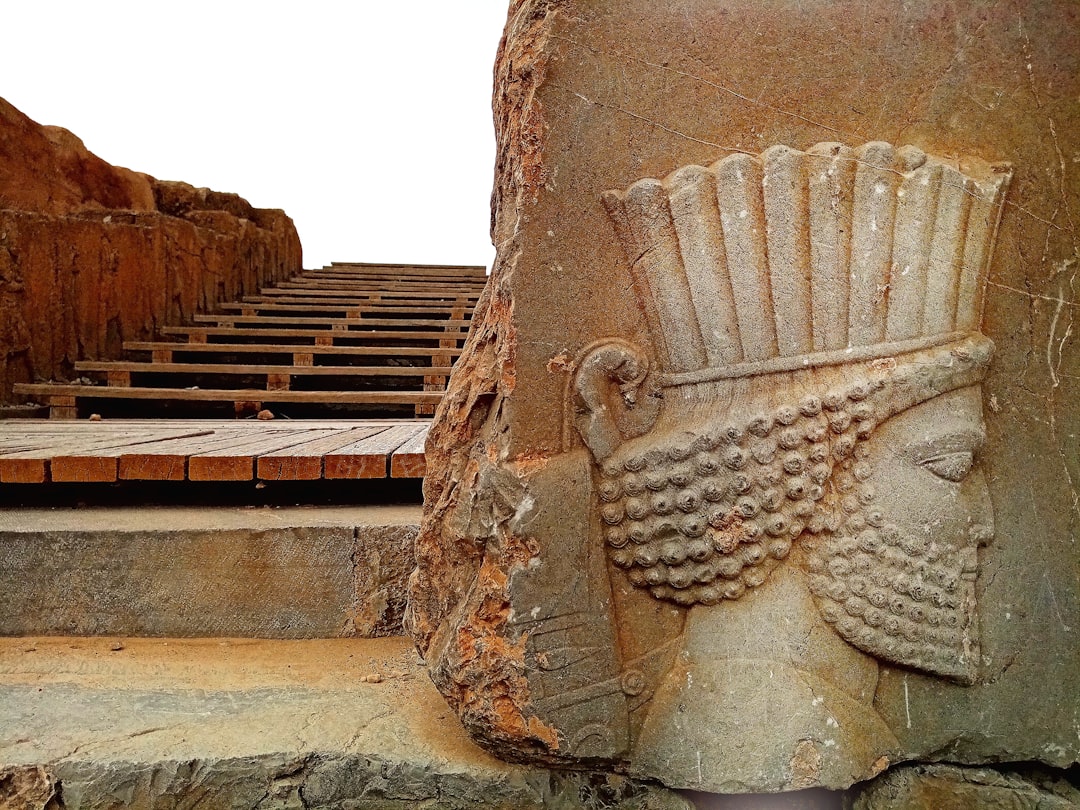Every May 15 (25th of Ordibehesht in the Iranian calendar), Iranians around the world commemorate Ferdowsi Day – a celebration of Abul-Qâsem Ferdowsī Tusi (Ferdowsi) and the Persian language. This date also marks Persian Language Day, honoring Ferdowsi as “the most influential figure in Persian literature”. Born around 940 CE near the city of Tus in northeastern Iran, Ferdowsi was a dehqān (landowner) who spent over three decades writing his masterpiece, the Shahnameh (“Book of Kings”). The Shahnameh – a sprawling epic of nearly 60,000 rhyming couplets – is regarded as Iran’s national epic and a foundational text of Persian culture. Even for Iranians living abroad, Ferdowsi Day is a chance to reconnect with their roots by honoring the poet who “revived national stories and breathed new life into the Persian language and literature”.
A bust of Ferdowsi (Tehran, 1934). Even a thousand years ago Iranians honored Ferdowsi’s legacy; in 1934 a commemorative bust was made for his millennial birthday, reflecting his status as Iran’s national poet.
Who Was Ferdowsi?
Ferdowsi was born c. 935 in a village near Tus. By tradition he belonged to a landowning family and lived comfortably on his estates. He had one daughter, and legend says he began writing the Shahnameh in order to provide her dowry. According to the 12th‑century scholar Nezāmī‑ye Arūżī, Ferdowsi worked on this epic for about 35 years. In 1010 CE he finally completed the Shahnameh and presented it to Sultan Maḥmūd of Ghazni. (Tradition holds that the Sultan at first tried to shortchange Ferdowsi – an episode immortalized by the angry final verses of the poem.)
Ferdowsi is often called the father of modern Persian. He wrote entirely in Persian, using the language of his own ancestors rather than Arabic, which was then common among scholars. His vigorous praise of Persian heritage – and refusal to borrow Arabic vocabulary – made him a symbol of cultural pride. Even today, Ferdowsi is revered as Hâkim-e Firdawsi (Hakīm, “sage” Ferdowsi) and “Iran’s national poet,” a “lofty” figure who preserved Iran’s literary spirit.
-
Lifespan: c. 940–1020. Born and died in Tus, Khorasan (northeast Iran).
-
Major Work: Shahnameh (“Book of Kings”), an epic poem of ~60,000 couplets.
-
Writing Period: Began around 977 and finished in 1010 (about 30 years of work).
-
Motivation: To preserve Persian history and provide for his family.
The Shahnameh: Persia’s Epic of Kings
The Shahnameh is Ferdowsi’s only surviving work, but it is unsurpassed in scope. It is indeed “the world’s longest epic poem created by a single poet”. The poem opens with cosmogony and the first Persian kings, and then follows Iran through three great ages – mythical, heroic, and historical – up to the Arab conquest of Persia. In between are tales of gods and men, demonic tyrants and noble heroes, love, betrayal, war and wisdom. Famous legends include the tragedy of Rostam and Sohrab, the rise of the king Jamshid, the tyranny of Zahhak, and the exploits of the mighty hero Rostam (often compared to Hercules). The Shahnameh is twice the length of Homer’s Iliad and Odyssey combined, with 62 stories and 990 chapters, making it more than three times longer than the Iliad.
The Shahnameh draws on much older sources: Ferdowsi based it on an earlier prose Shahnameh (itself a translation of a Sasanian “Book of Kings” from Middle Persian). He incorporated and expanded the work of a predecessor named Daqiqi, who had written only a few hundred verses before he died. But only a small portion of Ferdowsi’s epic was his own invention; most of it retells the traditional Iranian account of kings and heroes. In Ferdowsi’s hands these old stories became poetry, full of rhetorical flourish and moral reflection, and instantly beloved by Persian readers.
Ferdowsi’s own introduction describes the Shahnameh as written “midst toil and trouble” but “a lasting stimulus to glorious deeds”. And by many measures he succeeded: by the 11th century the Shahnameh had already made Persian once again a proud literary language. In fact, Ferdowsi’s epic revived Persian as a literary tongue. Scholars note that because of works like the Shahnameh, modern Persian is remarkably close to the language of Ferdowsi’s time. One famous commentator even compares Ferdowsi’s role in Persian to Dante’s in Italian: the Shahnameh “became one of the main pillars of the modern Persian language,” so that Ferdowsi’s epic effectively defined Persian for future generations.
Verses and Themes of the Shahnameh
Ferdowsi’s poetry is rich with themes of heroism, justice, fate, and the passing of life. He often reflects philosophically on human fortunes. For example, he bitterly observes that society seems upside-down:
“I turn to right and left, in all the earth
I see no signs of justice, sense or worth:
A man does evil deeds, and all his days
Are filled with luck and universal praise;
Another’s good in all he does – he dies
A wretched, broken man whom all despise.”
This verse (from early in the Shahnameh) illustrates the poet’s frustration that the wicked are often rewarded while the righteous suffer – a theme that resonates even today. He likewise muses on the transience of life and glory:
“But all this world is like a tale we hear –
Men’s evil, and their glory, disappear.”
“Such is the passing that you must leave,
All men must die, and it is vain to grieve.”
These lines remind the reader that earthly power and fame are fleeting – a humbling message embedded in heroic saga. Yet Ferdowsi also celebrates love and passion. In the tragic love story of Zal and Rudabeh (or other lovers), he writes with tenderness:
“From moment then to moment their desire
Gained strength, and wisdom fled before love’s fire;
Passion engulfed them, and these lovers lay
Entwined together till the break of day.”
Here the poetry is vivid and romantic – lovers lost in the power of love. Whether lamenting cruel fate or exalting devotion, Ferdowsi’s style remains accessible. Even in English translation, his verses ring true with universal truths about honor, loyalty, fate and human nature.
Ferdowsi’s Enduring Legacy
Today, Ferdowsi’s cultural impact is immeasurable. Persian speakers around the world grew up hearing the Shahnameh stories (and many Persian names come from it), and the poem is often taught in schools. In Iran the Shahnameh is considered as important as Homer’s epics are to the West. Its influence extends beyond literature: even rulers of later eras took names from its kings, and its heroes feature in art and folklore.
Importantly for Iranians abroad, the Shahnameh is a living connection to home. On Ferdowsi Day, Persian cultural centers and language classes often hold readings of Shahnameh passages and children recite his verses. Many Iranians (and aficionados of Persian culture) wear pins or share social media posts with Ferdowsi quotes. UNESCO and Iranian institutions officially mark May 15 as Persian Language Day to honor the preservation of Persian, thanks largely to Ferdowsi’s epic.
Modern statue of Ferdowsi (in Tehran’s Milad Tower). Monuments like this one underscore how Iranians continue to revere Ferdowsi as a national hero.
Even with the passing of a millennium, Ferdowsi’s relevance endures. His insistence on keeping Persian cultural memory alive makes him a hero of identity and resilience. Every time we read a line of the Shahnameh, sing the praises of Rostam, or ponder those immortal verses – “All men must die…” – we participate in a tradition Ferdowsi helped create. As one scholar put it, Ferdowsi’s work “preserved the mythology, history, and cultural identity of pre-Islamic Iran, serving as a vital repository for future generations”. In short, Ferdowsi is to Persian language what Shakespeare is to English or Dante to Italian – his pen forged a literary heritage that defines a nation.
Whether you’re an Iranian remembering your homeland or a non-Persian reader discovering Shahnameh, Ferdowsi Day is a celebration of storytelling, resilience, and the enduring power of a people’s shared heritage. As Ferdowsi himself wrote, “Though you have little wealth, fear not the decree of fate; for the ocean of the sea was once a drop of rain” – a line reminding us that even small efforts (like putting pen to paper) can shape history. On this day, we honor that effort and the timeless epic it produced.
Sources: Historical details from Encyclopædia Britannica, Persian cultural references, and scholarly essays. Translated Shahnameh excerpts are from modern English versions.





